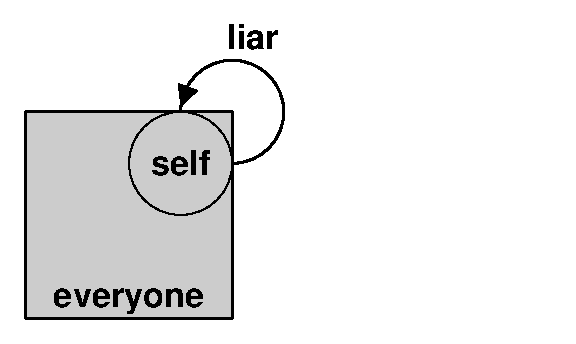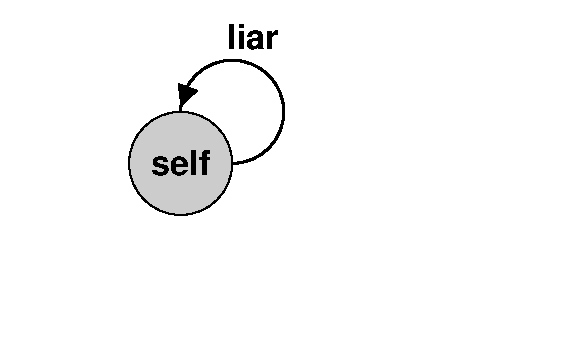Send
Close Add comments:
(status displays here)
Got it! This site "creationpie.org" uses cookies. You consent to this by clicking on "Got it!" or by continuing to use this website. Note: This appears on each machine/browser from which this site is accessed.
Titus 1:12-13 The Epimenides paradox about Cretans
1. Titus 1:12-13 The Epimenides paradox about Cretans
 Titus 1:12 One of themselves, even a prophet of their own, said, The Cretians are alway liars, evil beasts, slow bellies. [kjv]
Titus 1:12 One of themselves, even a prophet of their own, said, The Cretians are alway liars, evil beasts, slow bellies. [kjv]
 ειπεν τις εξ αυτων ιδιος αυτων προφητης κρητες αει ψευσται κακα θηρια γαστερες αργαι [gnt]
ειπεν τις εξ αυτων ιδιος αυτων προφητης κρητες αει ψευσται κακα θηρια γαστερες αργαι [gnt]
 1:13 This witness is true. Wherefore rebuke them sharply, that they may be sound in the faith; [kjv]
1:13 This witness is true. Wherefore rebuke them sharply, that they may be sound in the faith; [kjv]
 η μαρτυρια αυτη εστιν αληθης δι ην αιτιαν ελεγχε αυτους αποτομως ινα υγιαινωσιν εν τη πιστει [gnt]
η μαρτυρια αυτη εστιν αληθης δι ην αιτιαν ελεγχε αυτους αποτομως ινα υγιαινωσιν εν τη πιστει [gnt]
Russell paradox:
"I am lying". This is a self-referential paradox that results in an infinite regress. (no solution)
Cretan paradox: "
All people are liars". One truth-teller makes that person a liar. No contradiction or paradox. (simple solution)
The phrase "
All Cretans are liars" is known as the "
Epimenides paradox". Unlike the modern "
Russell paradox" to which it is often compared, the Epimenides paradox has a simple solution and does not make what Paul says in Titus 1 incorrect.
[out-lier]
2. Latin
 Titus 1:12 One of themselves, even a prophet of their own, said, The Cretians are alway liars, evil beasts, slow bellies. [kjv]
Titus 1:12 One of themselves, even a prophet of their own, said, The Cretians are alway liars, evil beasts, slow bellies. [kjv]
 ειπεν τις εξ αυτων ιδιος αυτων προφητης κρητες αει ψευσται κακα θηρια γαστερες αργαι [gnt]
ειπεν τις εξ αυτων ιδιος αυτων προφητης κρητες αει ψευσται κακα θηρια γαστερες αργαι [gnt]
Notice that the
KJV (King James Version) adds "
alway", to fit with the historical paradox, but that that word is not in the Greek. The word "
always" is in the Latin.
The Latin word "semper" ≈ "always" as in "semper fidelis" as "always faithful" as in the motto of the United States Marines.
3. Create and Epimenides
The writings of Epimenides are from about 600 B.C.
Epimenides made the following statement (about 600 B.C.)
"
All Cretans are liars".
This paradox is often confused with the Russell paradox (and variations).
For reference, the origin of the Epimenides Paradox is about the time of Nebuchadnezzar and Daniel in Babylon.
The Cretan paradox is referred to by Paul in Titus 1:11, where Paul is writing to Titus in Crete.
4. Poem
Here is the Greek poem (in English) from which the Epimenides Paradox arises.
They fashioned a tomb for thee, O holy and high one
The Cretans, always liars, evil beasts, idle bellies!
But thou art not dead: thou livest and abidest forever,
For in thee we live and move and have our being.
In this context, denying the deity of Zeus was the lie.
5. Math
The following are math logic quantifiers.

These quantifiers take logic from propositional (finite possibilities) logic to predicate (potentially infinite possibilities) logic. Paradoxes arise when negation is involved.
In math logic terms, the Epimenides paradox can be stated as follows, followed by the negation of the same statement.

Though there is some controversy about his origin, assume Epimenides is a Cretan.
Logically speaking, the statement of Epimenides is either
true or
false. To logically analyze his claim, one can look at both conclusions and see where each leads.
If Epimenides is telling the truth, then he is a liar - a contradiction.
If Epimenides is lying, then at least one Cretan is a truth teller - a real possibility on such a large island.
Another way to think about it is as follows.
6. He is not a Cretan

If Epimenides is not a Cretan (he is outside the system), then one truth-teller on Create makes him a liar.
It may be easier to think this way:
All others are liars. (One truth teller makes this false).
7. He is a Cretan

If Epimenides is a Cretan (he is inside the system), then one truth-teller on Create makes him a liar.
It may be easier to think this way:
Everyone is a liar. (One truth teller makes this false).
8. He is the only resident of Crete

If Epimenides is the only resident of Crete, the problem reduces to the Russell paradox.
One can think of it this way:
I am a liar .
9. Titus 1:12
KJV: One of themselves, even a prophet of their own, said, The Cretians are alway liars, evil beasts, slow bellies.
Greek: ειπεν τις εξ αυτων ιδιος αυτων προφητης κρητες αει ψευσται κακα θηρια γαστερες αργαι
Latin: dixit quidam ex illis proprius ipsorum propheta Cretenses semper mendaces malae bestiae ventres pigri
Luther: Es hat einer aus ihnen gesagt, ihr eigener Prophet: Die Kreter sind immer Lügner, böse Tiere und faule Bäuche.
Slavonic: Рече же некто от них, свой им пророк: Критяне присно лживи, злии зверие, утробы праздныя.
Russian: Из них же самих один стихотворец сказал: Критяне всегда лжецы, злые звери, утробы ленивые.
10. Titus 1:13
KJV: This witness is true. Wherefore rebuke them sharply, that they may be sound in the faith;
Greek: η μαρτυρια αυτη εστιν αληθης δι ην αιτιαν ελεγχε αυτους αποτομως ινα υγιαινωσιν εν τη πιστει
Latin: testimonium hoc verum est quam ob causam increpa illos dure ut sani sint in fide
Gothic: so ist weitwodei sunjeina. in thizozei fairinos gasak ins (hv) assaba, ei hailai sijaina in galaubeinai,
Luther: Dies Zeugnis ist wahr. Um der Sache willen strafe sie scharf, auf daß sie gesund seien im Glauben
11. Hasty astonishment
 Psalms 116:11 I said in my haste, All men are liars. [kjv]
Psalms 116:11 I said in my haste, All men are liars. [kjv]
 εγω ειπα εν τη εκστασει μου πας ανθρωπος ψευστης [lxx]
εγω ειπα εν τη εκστασει μου πας ανθρωπος ψευστης [lxx]
The
KJV uses "
haste" while the
LXX (Septuagint) uses the ancient Greek word
"ἐκστατικός" ≈ "astonished" and which is the source of the English word
"ecstatic".
The ancient Greek word
"ψευδής" ≈ "lying, false, untrue".
The "
All men are liars" is a variant of the Cretan liar paradox to which Paul refers in Titus 2. However, if the statement is coming through a prophet from God, then the self-reference of the Russell liar paradox is not present (or can be debated).
12. Psalms 116:11
KJV: I said in my haste, All men are liars.
Hebrew: אני אמרתי בחפזי כל האדם כזב׃
Greek: εγω ειπα εν τη εκστασει μου πας ανθρωπος ψευστης
13. End of page


 If Epimenides is not a Cretan (he is outside the system), then one truth-teller on Create makes him a liar.
If Epimenides is not a Cretan (he is outside the system), then one truth-teller on Create makes him a liar.
 If Epimenides is a Cretan (he is inside the system), then one truth-teller on Create makes him a liar.
If Epimenides is a Cretan (he is inside the system), then one truth-teller on Create makes him a liar.
 If Epimenides is the only resident of Crete, the problem reduces to the Russell paradox.
If Epimenides is the only resident of Crete, the problem reduces to the Russell paradox.